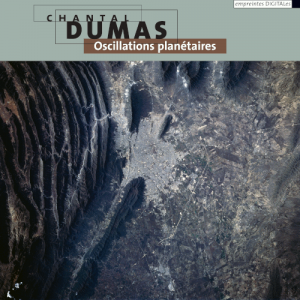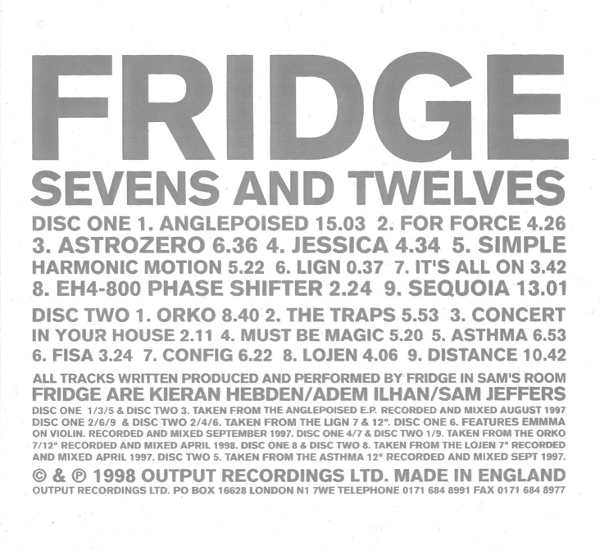 Commissioned by Deutschlandfunk Kultur in 2017 and broadcast first in July 2018, Oscillations Planétaires evokes the larger geological cycles of planet Earth, from the eruptions of geysers and volcanoes to the motion of the tides and onwards to the formation of mountain ranges and the tectonic movements of the continental plates themselves.
Commissioned by Deutschlandfunk Kultur in 2017 and broadcast first in July 2018, Oscillations Planétaires evokes the larger geological cycles of planet Earth, from the eruptions of geysers and volcanoes to the motion of the tides and onwards to the formation of mountain ranges and the tectonic movements of the continental plates themselves.
Chantal Dumas uses both conventional instrumentation , synthesizers and other electronics over the course of just under an hour and nine movements to represent her impressions and elucidations of an entire planet-wide ecosytem in motion. So while there is much that directly connects to the sounds of land masses at their most active, much of Oscillations Planétaires is necessarily impressionistic, the electronics wavering their metaphorical constructions in pulsating loops and babbling tones, their own low-frequency oscillations unable to run quite at geological rates.
The way in which the plates crumble and crash on “Convection Mantellique” is particularly striking, where magma bubbles and boils below like the liquid musculature rippling beneath the subsurface, and the “Geysers” spurt and hubble under the huffing and skittering sounds of Claire Marchand‘s flute, sputtering and rustling like eddies of superheated steam waiting to burst free. This it does, with ominous drama and a wetly resonant force, and the way which the soundscape is constructed is at once breathtaking and invigorating. Meanwhile, “Formation De Montagnes” seems to build the high peaks from electronic modulations, its rippling beeps and rolling drones combining like the machinery that The Radiophonic Workshop might have used to represent Slartibartfast‘s fjordal constructions in the original broadcast of The Hitch-hiker’s Guide To The Galaxy. Dumas lets the music sway and unfold, introducing searing banks of filtered waves and the occasional hint of a human chorale wafting on the swarming reverberations as formants drift lazily into the melded sonorities of “Marée Crustale”, and the terminal sussurus of “Plaque Antarctique De Loin En Loin” is plaintively mournful, marking the part of the planet’s surface undergoing perhaps its most shocking and profound moment of humanity-induced change.Perhaps unsurprisingly, “Magnétisme Terrestre” offers the best opportunity for her to let the synthesizers do their electrical thing, tickling streams of oscillator burble and radio static hum weave in and out of a continuous magnetic storm that flickers like a fading fluorescent tube. Likewise, though the doomiest moment might well be expected on “Ondes Sismiques”, instead Christian Olsen roughs up his drums, rolling thunderously as the ground shakes and a wailing warning sounds as the shape and face of the Earth’s foundations are rearranged.
Daniel Áñez (un)prepares and repurposes his piano while Olsen caresses and flutters at his drumkit to plumb the depths of the “Dorsale Médio-atlantique”, the dark and relatively unexplored waters and its pigmentless denizens glimpsed in the fluid tapping of the keys and the counterpointed percussion. It feels suitably horizonless, up and down rendered at different scales, heaving with anticipation as much as hinting at the vastness lurking beyond visible distances, though any threat is perhaps illusory this far down in the uncaring deeps, waters rushing and lapping at the senses as an interface between land and sea is finally achieved.As evocations of the grandeur of terrestrial existence goes, Oscillations Planétaires is rather remarkably successful, its balance between simulation and abstract allusion finely judged. This is not so much an ambient soundtrack as it is a startling paean to a world that will nevertheless endure, no matter how much relatively puny humanity might have realised belatedly that it has effected an apparently unstoppable series of environmental catastrophes on its only home. But Earth will abide, even if its bipedal surface-dwellers may not do so for much longer in the style to which they had recently liked to become accustomed. The Oscillations Planétaires will continue for another aeon or so; though entropy will inevitably claim the solar system too one day.
-Linus Tossio-


